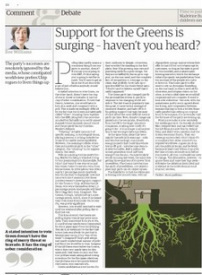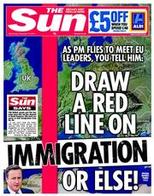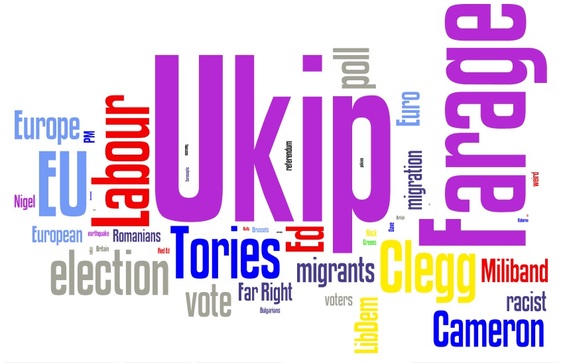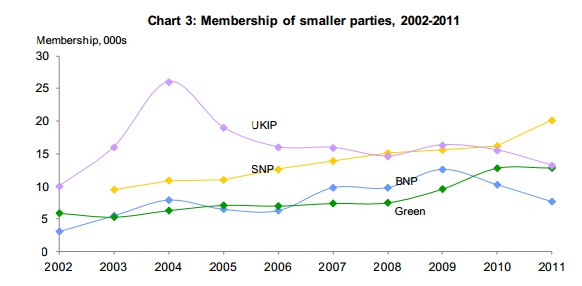The European elections auditHow the nationals covered the European and local campaigns from May 12-26
The last wordleNigel Farage promised an earthquake, but he didn't shake us up so much as send us to sleep, leaving the Press to trail behind him in an hypnotic trance.
Even the most serious-minded newspapers were under the Ukip spell, blindly following the "fourth force in politics" agenda. Those who dared to stray from the path ventured only so far as to record Ed eating a bacon sandwich or Boris and Dave playing around on Newark station. None of these three was showing any interest in the upcoming elections. Cameron and Johnson were campaigning for the June by-election; Miliband was looking still further ahead: to next year's general election. Political leaders chose not to address anything that might be affected by our choice of representative in Strasbourg, candidates chose not to tell us anything about themselves or what they stood for and newspapers by and large chose not to report anything that had anything to do with policy. Yet on the eve of the election, the leader writers and columnists were instructing us to exercise our franchise or forever hold our peace. If the candidates couldn't be bothered to stick a leaflet through the door, let alone knock on it and explain themselves, why should we vote for them? The only people talking about Europe were Nigel Farage, who talked about getting out, Nick Clegg, who talked about getting further in, neither of which could be achieved as a result of these elections.  Natalie Bennett Natalie Bennett
Oh yes, and we mustn't forget Natalie Bennett, who talked about climate change, fiscal policy and pan-European policing.
Natalie who? Bennett is the leader of the Green party, which beat the LibDems into fifth place. You can see how much coverage her party received in the wordle above. It's represented by that little green smudge under the giant "p" of Ukip and alongside the big yellow Clegg. She said afterwards that her party - which gained an MEP while the LibDems lost most of theirs - had secured more "vastly more votes per minute of TV airtime" than any other party The remark related to television, but it could equally have been about column inches of newsprint. The defence argument might be that the Greens were a minority party with around 7% of popular support. Ukip were at the top of the polls, the LibDems were part of the governing coalition, so these parties deserved and required coverage.
Yes, but why were Ukip topping the opinion polls? Might it have been anything to do with the rightwing papers' obsession with immigration and the Murdoch papers' obsession with Europe? The need to report on the LibDems' collapse did not absolve papers from the duty to report the rise of the party that beat them. Readers were likely interested to know who trumped one of our ruling parties. As SubScribe noted at the beginning of this exercise, the election news pages were virtually policy-free zones. The word fracking, for example, might have been expected to feature in the wordle. It did feature in headlines, but in a succession of Nimby stories rather than in relation to party policies or hustings debate. News editors seemed to want personality (Farage wins hands down) and trends (ditto) - even if the trends have been created, spotted and done to death elsewhere. Once again they lagged behind social media and bloggers. More worrying, they were also behind their own columnists. The comment sections were more illuminating than the news pages. I have sat in the newsroom cauldron, pumping out two, three, four pages an hour and mocking the "thinkers" in their cool cubicles upstairs/downstairs who have to produce only one page a day or even a couple of columns a week. I have listened to these people opining in conferences and thought "What do they know about news? Come on, we've a paper to get out." With the benefit of distance, I can see that far from missing the point, these people are often grasping the next one. If only newsdesks would stop and consider what they have to say. Or rather, if only the news operations had the time to stop and consider - and the staff to follow up. To return to the Greens, here's Zoe Williams in the Guardian on the eve of polling day: 
The Greens are polling higher than at any point since 1989. Their share went up from 3% to 8% in a poll whose results were interpreted by every paper apart from the Evening Standard as testament to the fact that voters hate everybody...
Imagine if Ukip's poll ratings had nearly tripled, what manner of political flurry we would be in then. Inagine if the Lb Dems went below the Greens, which they very nearly have ( in this same poll they were on 9%); in a YouGov poll last week asking about voting intentions for the European elections, the Lib Dems were two points behind the Greens, who reached 12%. Green candidates are...so baffled by the surge of support, on the one hand, and the complete lack of recognition or coverage, on the other, that as Molly Scott Cato says: "I find it hard to believe myself that it has really happened." ...The Green party's offer used to rely on dystopian foretelling in which we'd all fry and utopian vision in which we would all co-operate and not compete. It used to look a bit ridiculous. Now, with the mainstream pretty much agreed about the frying and co-operation between humans starting to look a lot less financially painful than relying on corporations to be humane, it is no wonder that the fortunes of the party are looking up. What is a wonder is how resolutely the media ignores it. On Sunday Andrew Marr stepped back and marvelled that the Lib Dems are now fourth behind Ukip and didn't even mention that the Greens were joint fourth. Their successes go unrecorded. I don't think it's a conspiracy but rather a kind of constipated worldview: rogues can drop into the political terrain and be feted because at least they'll liven it up a bit. Ms Scott Cato went on to become an MEP for the South West and the LibDems were beaten into fifth place. Williams's own paper fell into the trap that she described, with its only mention of the Greens on the news pages - a report of campaigning in Liverpool - coming the day before her column. Funnily enough, looking back at that story on the Guardian website, we can see that the comment thread reinforces Williams's point, starting with: "Out of interest, why does this come under the 'Environment' section but not the 'Politics' one, where instead we're flooded with articles about UKIP? Surely as the Green Party is a political party and this is about the European elections, this is primarily a 'Politics' issue?" and Why is a Green political initiative being reported in the environment section? Are the editors afraid somebody might notice it if it was in the news section? The first comment, from "Mr Razza", is recommended by 550 people, the second, from "Homerloan" , has 268 recommendations. To conclude this exercise, SubScribe would like to recommend two further columns. The first, by Independent founder Andreas Whittam Smith, makes the point about politicians campaigning for the wrong election far more eloquently than SubScribe. Unfortunately it is not available on the paper's website. The second, by Matthew Parris in the Times, has been likened by Peter Preston to someone farting in church. All through the campaign columnists (including Whittam Smith's Independent co-founder Stephen Glover) said that to brand Ukip as racist was to brand its supporters - your readers, their voters - as racist. Parris tells it like it is. And magnificently. Andreas Whittam SmithI am not going to vote in next week's elections for the European Parliament. This abstention would be a first for me. Until now, I have voted in every election for which I am eligible, national, European or local. The main reason why I won't make the short walk to the polling station round the corner is a basic one. Matthew ParrisMr Farage loves to assume the populist "excuse me..." and "sorry but.." voice of the small man whom the Powers That Be are trying to squash (yesterday he was not going anywhere, "I'm afraid"). So let me too try that idiotic voice: |
|
The European elections audit
How the Press covered the campaign and the aftermath Plus the papers' detailed breakdown The Daily Telegraph The Guardian The Independent Daily Mirror Daily Express The Times Daily Mail The Sun Some figures
Conservatives At the end of 2013 the party had 134,000 members. This was widely reported to be barely more than half the membership when David Cameron became the party's leader in 2005, and it compares with 177,000 in 2010. Labour At the end of 2013, the party had 187,500 members. That was about 6,000 down on 2012, but well up on the 156,000 of 2011. LibDems At the end of 2013, the party had 43,500 members. That was an improvement on the previous year, but down from a peak of 73,000 in 2001. Ukip At the end of 2013, the party had 32,500 members. By the time of the European elections that had risen to more than 38,000. Membership has fluctuated through this century from around 10,000 in 2002, up to 25,000 a couple of years later and back down again to around 16,000 in 2009 and dipping to 12,000 in 2011. Greens At the end of 2013, the party had fewer than 14,000 members. Last week it announced that this had risen by 23% to pass the 17,000 mark and that it hoped to reach 20,000 by the end of the year. At the beginning of the century it had just over 5,000 members. Editor's pick



|
Please sign up for SubScribe updates
(no spam, no more than one every week or two)
|
|
|









